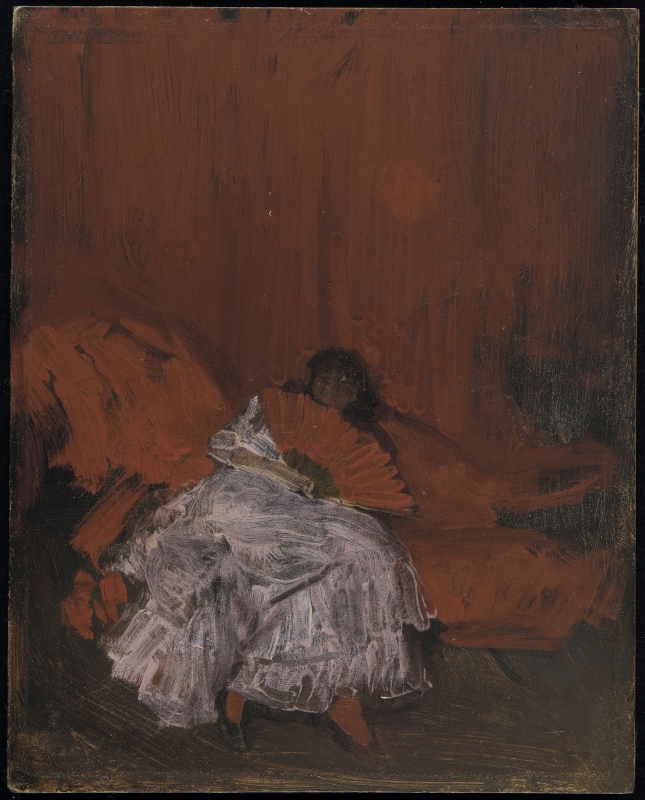Titles
Several possible titles have been suggested:
- 'Red and pink: La Petite Mephisto' (1884, Dowdeswell). 1
- 'Note en rouge: La petite Méphisto' (1887, Petit). 2
- 'Petite Mephiste' (1904, Copley Society, Boston). 3
- 'Petite Méphisto... Esquisse' (1905, Œuvres de James McNeill Whistler, Paris). 4
- 'Red and Pink: La Petite Mephisto' (1980, YMSM). 5
The name 'Mephisto' is a variant or nickname for Mephistopheles, a demon (alternatively known as Satan, Lucifer, the devil, etc) from the Faust legend. The name is associated with the Faust legend of a scholar – based on the historical Johann Georg Faust – who wagers his soul with the Devil.
The vivid red background in Whistler's painting, the red fan and the seductive pose of the model (despite her white dress), may have suggested the demonic association. Whistler's title possibly reflects his interest, in the late 1870s, in the burlesques produced at the Gaiety Theatre in London, which starred Ellen ('Nellie') Farren (1848-1904), and included Little Dr Faust (see Harmony in Blue: The Duet [YMSM 196]).
In contemporary culture, a fictional melodramatic villain, 'Mephisto', has appeared in comic books published by Marvel Comics (first in Silver Surfer #3, December 1968).
Description
A figure study in vertical format. A young woman in a white dress sits – or rather sprawls – on a red sofa holding a large red fan. The background is a warm reddish brown, the floor a darker brown.
Sitter
Possibly Millie Finch (fl. 1875-1885). Whistler described her to Charles William Dowdeswell (1832-1915) in 1884 as 'the Red Girl'. 6
The colour scheme, and the woman's clothes and fan, are very like those seen in Note en rouge: L'Eventail [YMSM 256].
The title, possibly inspired by memories of Little Dr Faust has led to suggestions that the model was Ellen ('Nellie') Farren (1848-1904), the dancer who took a role in that burlesque at the Gaiety Theatre in 1877/1878. 7 However, Whistler's painting dates from several years later, and there is no record of her posing at this later date.
Comments
Interestingly, Curry explores links with images of cafe concerts by Hilaire-Germain-Edgar Degas (1834-1917), and quotes Charles Baudelaire (1821-1867), who associated courtesans and actresses with magic, devilry and the colours of hell:
'Sur un fond d'une lumière infernale ou sur un fond d'aurore boréale, rouge, orangé, sulfureux, rose (le rose révélant une idée d'extase dans la frivolité, quelquefois violet (couleur affectionnée des chanoinesses, braise qui s'éteint derrière un rideau d'azur), sur ces fonds magiques, imitant diversement les feux de Bengale, s'enlève l'image variée de la beauté interlope.'
Translated: 'Against a background of hellish light, or an aurora borealis, red, orange, sulphurous, pink (the pink expressing an idea of ecstasy amid frivolity), sometimes purple (the favorite color of canonesses, like dying embers seen through an azure curtain), against magical backgrounds, variously imitating Bengal Lights, there arises the varied image of wanton beauty.' 8
Notes:
1: 'Notes' - 'Harmonies' - 'Nocturnes', Messrs Dowdeswell, London, 1884 (cat. no. 51).
2: Exposition Internationale de Peinture et de Sculpture, Galerie Georges Petit, Paris, 1887 (cat. no. 164).
3: Oil Paintings, Water Colors, Pastels and Drawings: Memorial Exhibition of the Works of Mr. J. McNeill Whistler, Copley Society, Boston, 1904 (cat. no. 14).
4: Œuvres de James McNeill Whistler, Palais de l'Ecole des Beaux-Arts, Paris, 1905 (cat. no. 52).
5: YMSM 1980 [more] (cat. no. 255).
6: [1/14 May 1884], GUW #08653.
7: National Portrait Gallery website at http://npg.si.edu/object/npg_02.147.
8: Baudelaire, Charles, The Painter of Modern Life: Women and Prostitutes, Paris, 1863. Curry 1984 [more] , p. 144, illustrating Degas' Cabaret, pastel over monotype, Corcoran, William A. Clark collection (National Gallery of Art).
Last updated: 31st December 2020 by Margaret






